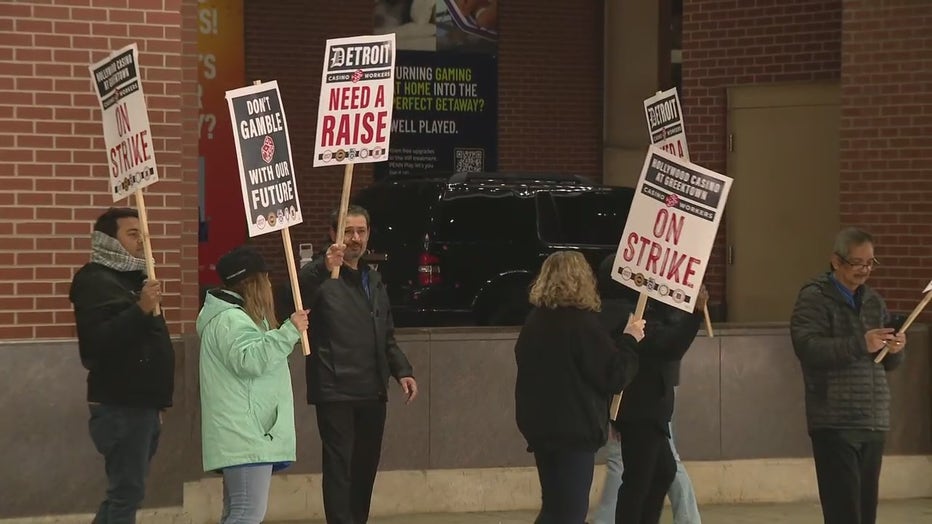Detroit casino workers reach strike deadline without new deal with gaming centers
DETROIT (FOX 2) - Following a failure to agree on a contract with MGM Grand, MotorCity Casino, and Hollywood Casino at Greektown, the union representing staff at the three gambling centers went on strike Tuesday.
The Detroit Casino Council has been negotiating with the three casino businesses for weeks, arguing they have since recovered from the pandemic and made record profits. Meanwhile, the thousands of dealers, cleaning staff, food and beverage workers, valets, and engineers have been left behind, the DCC said.
Despite setting a noon deadline for a strike on Monday, no deal was reached - a first for the city.
"Making the decision to strike is never easy, but it’s past time for the workers who keep Detroit’s casinos running to get their fair share," Nia Winston, President of UNITE HERE Local 24 said in a statement. "The city’s big three casino operators are earning more than ever, and we’re prepared to stay out on strike until we get what we deserve."
According to an analysis of a potential strike, it could cost $738,000 in state and city tax revenue for Michigan and Detroit per day. There's also millions of dollars on the line for the casinos, which bring in close to $3.5 million a day between the three businesses.
It could particularly hurt the city since gaming taxes make up the second-largest source of tax revenue at $452,000 a day.
3,700 workers strike Detroit casinos
Thousands of dealers, cleaning staff, food and beverage workers, valets, and engineers make up the unionized workers that operate the three Detroit gaming centers. They are now picketing for a new deal after rejecting contract offers proposed Tuesday morning.
FOX 2 reached out to the Detroit mayor's office for comment, but did not hear back.
In response to the strike, Penn Entertainment which runs Greektown said it was disappointed by the decision to strike.
"…we have made generous, progressive settlement offers that position our team members and business for sustainable success. We will remain open for business to serve our customers and are committed to continued good-faith bargaining with the Detroit Casino Council to resolve the issues at hand as soon as possible."
Five unions make up the DCC: Local 24, United Auto Workers, Teamsters Local 1038, Operating Engineers Local 324, and the Michigan Regional Council of Carpenters.
MORE: How much money Detroit could lose from a casino strike
According to an update from the DCC, negotiations went on for months without reaching a deal. The casinos offered a final proposal late Tuesday morning that the unions rejected. They said it did not meet their demands, which included protecting health care, job security, retirement benefits, and reducing workloads.
They also asked for increased wages.
"The company is offering us nickels and dimes, and they want us to pay more for healthcare," says Terri Sykes, a dealer at MotorCity Casino and President of UAW Local 7777. "As a two-time breast cancer survivor, I’m fighting to protect our health care. These companies are making more than ever, and it’s time they respect us for all the sacrifices we made to keep the doors open during the pandemic."

Union organizers handed out picket signs ahead of the noon deadline for members to strike the casinos.
Workers previously authorized the union to strike with 99% voting in favor. The collective bargaining agreement between the two parties expired Oct. 16.
The strike impact report also said "all significant revenue generating operations" could be affected. A breakdown of the money that each casino brings in a day is below:
- $1.7 million per day in revenues for MGM Grand Detroit (operated by MGM Resorts International);
- $1.1 million per day in revenues for MotorCity Casino;
- $652,000 per day in revenues for Hollywood Casino at Greektown (operated by PENN Entertainment)
For the city of Detroit, a 7-day strike could cost it $3.2 million and the state of Michigan $2 million. If the strike drags on 30 days, it would mean $22.1 million in tax revenue would be at risk.
Detroit casino worker strike looms
Workers at Detroit's three casinos are prepared to walk off the job if a contract agreement is not reached by 11:59 p.m. Monday.

